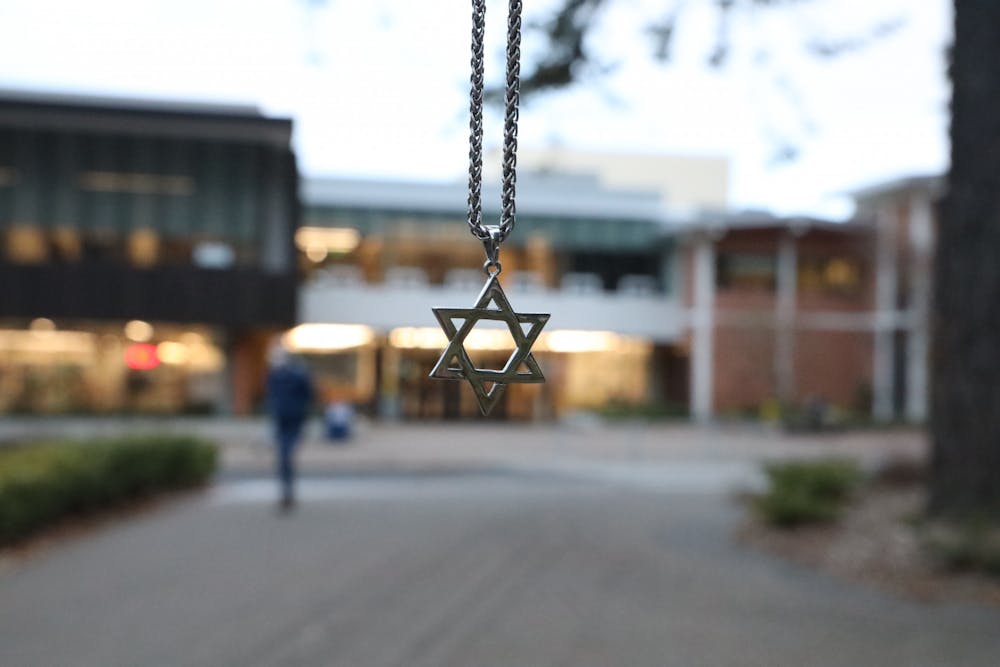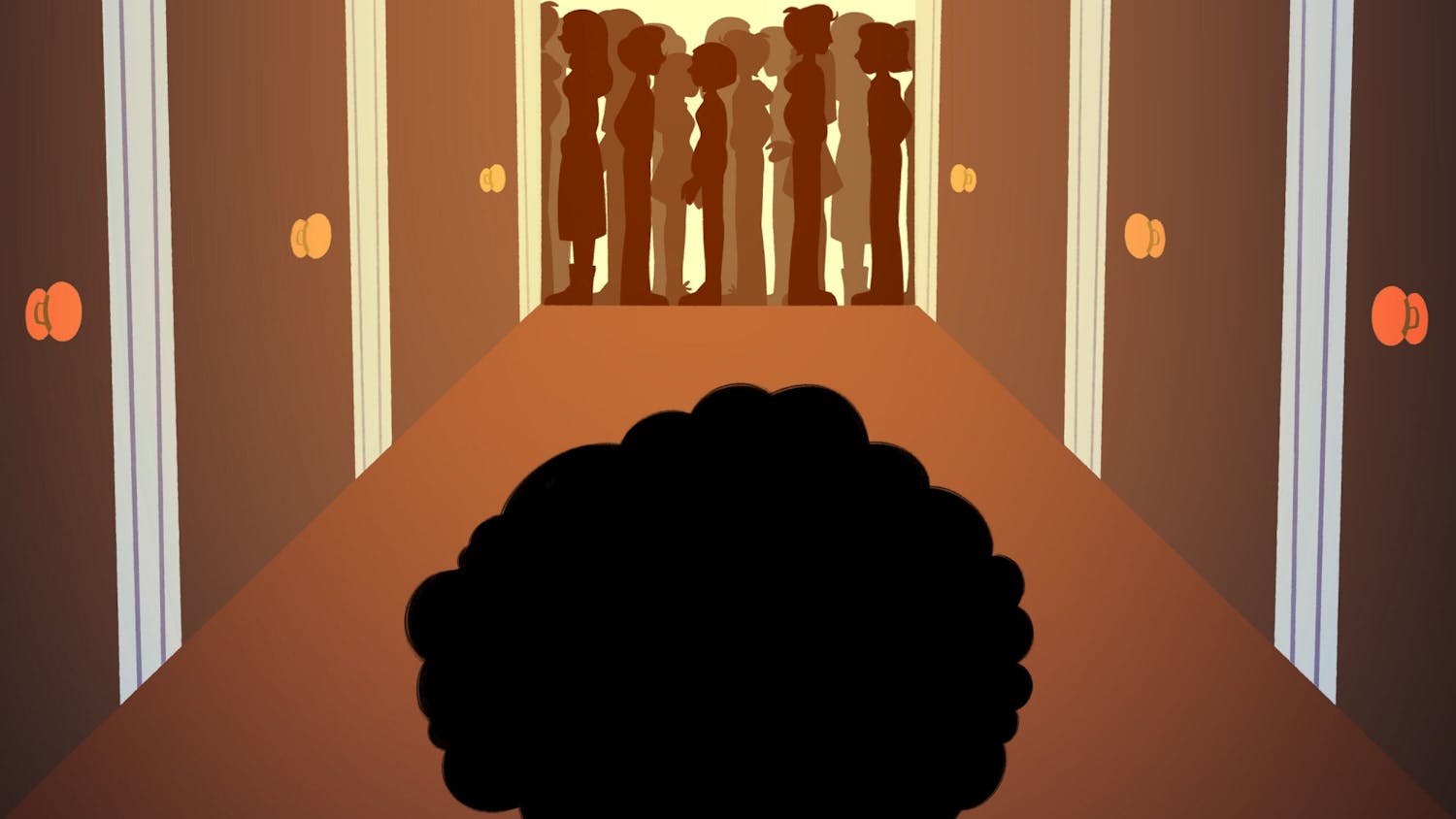Editing credit to Elisha Arafel and Chava Spokoiny, WWU Jewish on Campus Ambassadors
Resources for reporting or combatting antisemitism, and other support networks:
Western Washington University Structural Equity and Bias Response Team
Content warning: This piece contains discussion of antisemitism and hatred.
Submission by Ian Frank and Finn Kurtz, Hillel of WWU board members
On the week of Oct. 20, two antisemitic displays were found on the “free speech” board in the Viking Union. The first depicted an antisemitic caricature, and the second was the Nazi dog whistle “1488.” This understandably affected the Jewish student body at Western Washington University, and unfortunately, this kind of antisemitism is nothing new in our culture or at WWU.
In 2021, the Anti-Defamation League (ADL) reported that antisemitic incidents in the United States rose 34% from 2020, which is the highest number of incidents on record since the group began tracking antisemitic bigotry in 1979. Antisemitism is abuse that exists on the micro and the macro level and has a profound effect — and must be continuously combated — on both of these levels.
As board members of WWU Hillel, we’ve been witness to and victims of this rising bigotry, and we’ve felt the unease and fear in our community rise with it. Jewish students on our campus regularly face antisemitic incidents ranging from microaggressions and recitation of antisemitic tropes to open violence and hatred.
Jewish On Campus has reported on a few of these events on their social media, but we feel the weight of every attack, whether they’re publicized or not. The display of violent antisemitic messaging in public spaces, and the acts of violent hatred our community has faced, leave us with a sense of fear and isolation, and it damages our trust of the broader Western Washington community that we consider ourselves a part of. It is exhausting and far from new.
The present situation reminds us that Western’s campus is no stranger to antisemitic incidents. Four years ago, books in the Jewish studies section of Wilson Library were graffitied with antisemitic phrases and symbols. This shocking attack on the Jewish community still impacts us — even one antisemitic act of violence has a chilling effect on Jewish students.
There are subtle, more indirect consequences of antisemitism, such as Jewish students not wearing public markings of Jewish identity or local Jewish organizations like Hillel and Chabad taking more steps to ensure security at events.
Antisemitism, like all hatred and violence, ultimately contributes to a culture of hatred beyond just the Jewish community. It’s imperative for the broader Western Washington community to come together as a school “[committed] to equity and justice and respect for the rights and dignity of others” to confront the hate speech and violence in our midst.
More recently, a student who will remain anonymous was accosted last year on Highland Drive for being visibly Jewish. She was chased past the Haggard Hall bus stop in the heart of campus by a man yelling slurs while Nazi saluting her. This incident occurred in broad daylight, near the Western library and around many people, and yet the student was not assisted, despite loud cries and begging for help from every passerby, nor was this man stopped or even questioned. The student eventually was able to take refuge in the library, where the police were called and other students reached out to bias response teams on campus.
Initial pleas to the Ethnic Student Center weren’t met with a response. It was only later, after the police were called, that action was taken. This incident, happening across the street from the Rohr Center for Jewish Life, is extremely troubling. The fact that this student was allowed to be the target of such vitriolic antisemitism without any bystander coming to their aid, nor decisive response by the students or faculties on campus, makes it clear how much awareness and action are needed. We cannot stand idly by as these sorts of attacks occur on campus.
The first step to dismantling antisemitism is to recognize it. Sadly, antisemitism comes in many forms, and some are intentionally covert. “Dog whistles” are acronyms, words or phrases that seem banal or nonsensical at first glance.
Intentionally innocuous to the uninitiated, they both serve as a signal to those familiar with the terms of various extremist political ideologies that the user is one of them and to frighten and isolate the targeted group. The language is intentionally coded so that those who attempt to raise awareness of the hate being leveraged against them are often dismissed and told they are overreacting or misinterpreting the intent of the perpetrator.
As an example, “1488,” the numbers found on the Free Speech Board, is one of these dog whistles. The 14 refers to the “14 Words,” a white supremacist creed, and the 88 refers to the eighth letter of the alphabet, H, combined to become HH, or “Heil Hitler.” The numbers are meaningless on their own but actually represent a statement of genocidal intent.
There are too many of these dog whistles to count, but the Anti-Defamation League has a resource that can be used to help identify where these sorts of symbols are used and in what contexts they’re often found.
Some antisemitism isn’t recognized through dog whistles but rather through micro (or macro) aggressions. In the case of a microaggression, the hate speech isn’t hidden through the guise of a code but rather through ambiguity. In the case of a macroaggression, the hate speech is barely hidden or isn’t hidden at all. Macroaggressive attacks, like the graffitied books or the accosted student we mentioned earlier, are the most obvious and fearsome of hate crimes, but they exist on the same spectrum as a microaggression, and as such, both must be addressed to dismantle antisemitism.
For example, in a conversation about Judaism in the United States, one should be aware to not hold the Jewish people collectively responsible for the actions of individual Jews or Jewish organizations. It’s never reasonable or appropriate to pressure a Jewish person to disclose their opinion on a perceived Jewish issue, simply because of their cultural background and ethnicity.
Other common harmful rhetoric used with Jews or when discussing Jewish issues is Holocaust revisionism. Attempts to diminish the Holocaust or to erroneously compare it to other issues are both problematic and harmful. Such as when anti-abortion groups on campus compare abortion to the Holocaust, both diminishing the scale of the genocide, total ethnic extermination and drawing highly offensive comparisons for Jewish women who exercise their right to choose.
A third common piece of harmful rhetoric is Jewish ethnic and cultural erasure or expressions of Christian hegemony — the systemic social privileges and advantages Christianity is given in our culture, which can be weaponized against Jews. This can manifest in many forms, from the assumption that Judaism is purely a religion, theories that Jews as a people do not originate from the Levant and are thus lying about their origins, to denying religious accommodations to Jews for holidays and Shabbat observance.
Once one identifies antisemitism, the next step is reporting it. WWU Hillel and Jewish On Campus are both organizations available to students who have witnessed or been victimized by antisemitism and will help them talk with students, professors, Western administration and access any other resources they need.
Western’s Bias Response Team is the primary resource for antisemitism and other issues of hate speech on campus. Their office is available for informal mediation as well as formal investigations. Other national Jewish organizations, such as the Anti-Defamation League, also have bias response teams that will aid students and affected persons in accessing the resources they need in the case of an antisemitic incident.
We at Hillel of Western ask that our community not stand idly by as antisemitism rises in the United States and here on campus. We love the Western Washington community and want to uphold its values of diversity and inclusion, but that means we must all stay vigilant against all forms of hatred, including antisemitism, whether subtle or overt. We want to combat hate together, today and every day, for the sake of a better tomorrow.
Ian Frank is a third-year student at Western Washington University and a board member of Hillel of WWU. He is an Economics and Theatre Arts double major.
Finn Kurtz is a third-year student at Western Washington University and a board member of Hillel of WWU. He was previously a reporter for The Front, and he is majoring in History and Political Science and minoring in Journalism.






